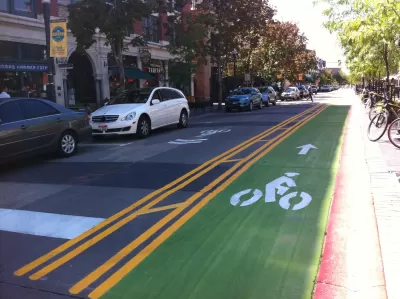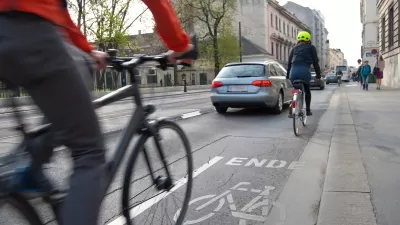A common refrain among politicians who oppose bike infrastructure investments is that people who bike don't pay for those projects. What's a bike advocate to do?

Dave Cieslewicz, of the Bike Federation of Wisconsin, explains how he responds to a fairly standard question posed to bike advocates: Why don’t cyclists want to pay for their own bike lanes?
As Cieslewicz notes, the idea to tax bike riders goes beyond idle musings. A few years ago the state of Wisconsin considered a budget amendment that "would have imposed a $25 'registration fee' on every new adult-sized bike purchase in the state." Thus, the question requires a good answer. Here, Cieslewicz provides his standard response to the line of inquiry:
…most cyclists are also drivers, so we do pay gas taxes and vehicle registration fees that go to fund roads, including bike lanes, paved shoulders and the like. When we ride state trails – and some local ones – we pay for trail passes. And then there’s the savings in wear and tear on the roads, the lessened need for expensive car parking, the reduction in pollutants and green house gas emissions and the personal health benefits that end up saving everybody money in the long run.
Cieslewicz realizes, however, that his standard inquiry can't defeat the "intellectual Teflon" of the political opposition. One idea that failed to achieve adoption was voluntary bike registration. In this post, Cieslewicz offers another idea: "expanded use of current local registration fee revenues."
FULL STORY: Tax Cyclists for Road Upgrades?

Planetizen Federal Action Tracker
A weekly monitor of how Trump’s orders and actions are impacting planners and planning in America.

Maui's Vacation Rental Debate Turns Ugly
Verbal attacks, misinformation campaigns and fistfights plague a high-stakes debate to convert thousands of vacation rentals into long-term housing.

Restaurant Patios Were a Pandemic Win — Why Were They so Hard to Keep?
Social distancing requirements and changes in travel patterns prompted cities to pilot new uses for street and sidewalk space. Then it got complicated.

In California Battle of Housing vs. Environment, Housing Just Won
A new state law significantly limits the power of CEQA, an environmental review law that served as a powerful tool for blocking new development.

Boulder Eliminates Parking Minimums Citywide
Officials estimate the cost of building a single underground parking space at up to $100,000.

Orange County, Florida Adopts Largest US “Sprawl Repair” Code
The ‘Orange Code’ seeks to rectify decades of sprawl-inducing, car-oriented development.
Urban Design for Planners 1: Software Tools
This six-course series explores essential urban design concepts using open source software and equips planners with the tools they need to participate fully in the urban design process.
Planning for Universal Design
Learn the tools for implementing Universal Design in planning regulations.
Heyer Gruel & Associates PA
JM Goldson LLC
Custer County Colorado
City of Camden Redevelopment Agency
City of Astoria
Transportation Research & Education Center (TREC) at Portland State University
Jefferson Parish Government
Camden Redevelopment Agency
City of Claremont





























